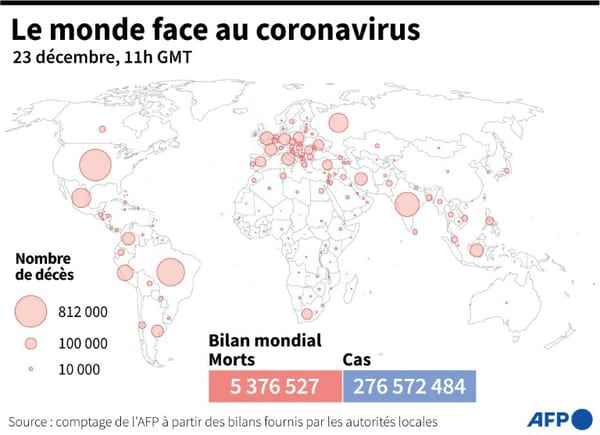China imposed strict containment on Thursday on the 13 million inhabitants of the city of Xi’an, due to a rebound in the Covid-19 epidemic whose Omicron variant continues its meteoric rise in the world, leading to new restrictions in Europe.
Faced with the surge of Omicron, the Swedish-British laboratory AstraZeneca said Thursday that a third dose of its vaccine against Covid-19 “significantly” increased the level of antibodies against this variant.
Deserted streets, massive screening, cordoned off neighborhoods: a few dozen cases of coronavirus in Xi’an, in northern China, were enough for the Beijing authorities to lock down this city of 13 million inhabitants, under their draconian policy of “zero Covid” as the opening of the Winter Olympics approaches on February 4.
All residents of the former Chinese capital must stay at home “unless there is a compelling reason”, with only one person per household being allowed to shop every two days. All “non-essential” businesses have had to close. The inhabitants can no longer leave the city without authorization and the entire population will be screened.
These measures recall the 76-day confinement imposed in early 2020 by the authorities in Wuhan, a city in central China where the virus was first detected at the end of 2019.
Elsewhere in the world, the highly contagious Omicron variant now constitutes 73% of new contaminations in the United States.
The United Kingdom recorded a record 106,000 cases for Wednesday alone in the country among the hardest hit in the world (more than 147,500 dead), which is trying to speed up vaccination.
Scotland announced the closure of nightclubs on Thursday. Northern Ireland and Wales had already tightened restrictions. For England, Boris Johnson’s government is procrastinating, relying in particular on two studies showing a lower risk of hospitalization with the Omicron variant compared to the dominant Delta until recently.
President Emmanuel Macron called on the French to “take care of each other”, in particular through tests or self-tests before reuniting with their loved ones for the end of the year celebrations.
With the arrival of the Omicron variant, 84,272 new cases of Covid-19 were confirmed on Wednesday in France and the Minister of Health Olivier Véran estimated that “we will very likely exceed 100,000 contaminations per day by the end of the month”.
– Curfew in Catalonia –
Spain also recorded a record of more than 60,000 cases on Wednesday and will once again make it compulsory to wear masks outdoors from Christmas. On Thursday, the Spanish justice authorized the establishment of a night curfew in much of Catalonia.
Greece also announced Thursday that wearing a mask would be mandatory indoors and outdoors during the holidays. All public Christmas and New Year’s festivities are canceled and travelers arriving in the country are encouraged to get tested.
New measures come into force Thursday in Sweden: teleworking must be privileged and public events bringing together more than 500 people will require a vaccination pass.
And on Christmas Eve, the first German company Lufthansa had to cancel several intercontinental flights, especially to North America, because too many pilots fell ill. In France, regional trains are canceled, a phenomenon which remains however “marginal”, specified the company of the railways SNCF.
– Fewer hospitalizations –
“Omicron is becoming, or has already become, dominant in several countries including Denmark, Portugal and the UK, where numbers are doubling every one and a half to three days, resulting in unprecedented rates of transmission.” , said Hans Kluge, WHO director for Europe.
According to initial studies from South Africa, Scotland and England in recent days, Omicron appears to result in fewer hospitalizations than Delta.
But while judging this positive, the scientific community warns against an optical effect. Because even if it is confirmed that Omicron is less dangerous, it is much more contagious, including in people who have been vaccinated or who have already had the Covid.
The consequences could therefore be serious at the collective level. The number of cases, which seems to double every two to three days, could automatically lead to an increase in the number of hospitalized patients – in particular the unvaccinated and the so-called fragile people (very old, or immunocompromised for example) – and once again overwhelm health systems.
Even considered for the moment as less lethal, the Omicron variant could therefore theoretically lead to a large number of deaths.

A Covid-19 patient in the intensive care unit of the Center hospitalier régional de la Citadelle in Liège, Belgium, December 21, 2021
© AFP – JOHN THYS
The pandemic has killed at least 5,376,527 people worldwide since the end of 2019, according to a report established by AFP from official sources on Thursday. WHO estimates that the real toll could be two to three times higher.
burx-at / sg
All rights of reproduction and representation reserved. © (2021) Agence France-Presse


